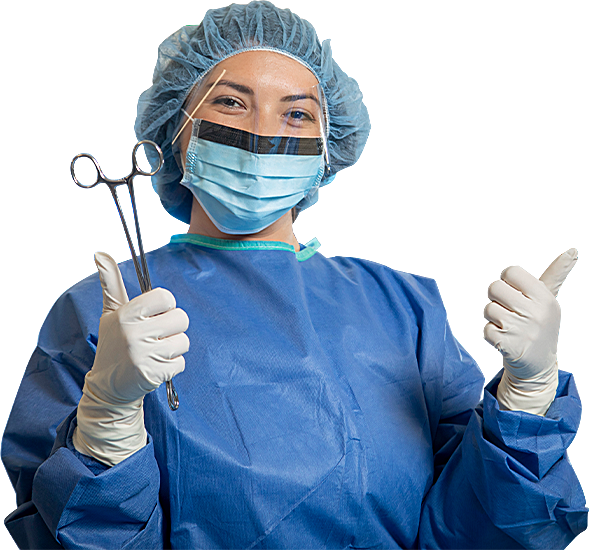Surgical Technology
Surgical Technologists (also known as surgical techs, operating room technicians, and OR techs) assist in surgical operations, preparing operating rooms and helping surgeons, nurses, and doctors before and during surgical procedures.
Surgical Technologists are a vital member of the operating room team, passing instruments to surgeons during surgeries, maintaining sterile fields, keeping instrument tables organized and managing operating room supplies to ensure that procedures flow smoothly and successful.
Graduates of this program earn their Associate of Occupational Science (AOS) degree and are qualified to work in hospitals, delivery rooms, ambulatory/out-patient surgery centers and medical clinics providing surgical services.
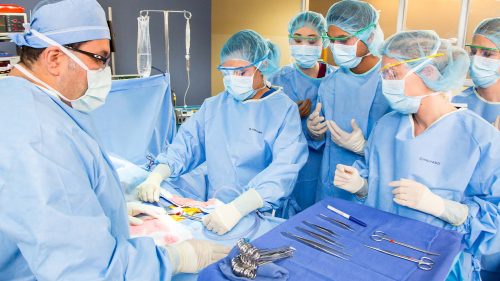
Surgical Technology
Surgical Technology Overview
Surgical Technologists, also called operating room technicians, prepare operating rooms, arrange equipment, and assist doctors during surgeries. Surgical Technologists are responsible for preparing the operating room by setting up surgical instruments and equipment, preparing patients for surgery, helping the surgical team put on sterile gowns and gloves, and preparing sterile solutions and medications used in surgery.
Once the operation is complete, Surgical Technologists may apply bandages and other dressings to the incision site. They may also help transfer patients to recovery rooms and restock operating rooms after a procedure.
Surgical Technologists routinely perform a variety of important tasks, including:
The Surgical Technologist program at North-West College is a career-focused program that teaches technical skills and provides the hands-on training experience required to begin working with surgeons, anesthesiologists, certified registered nurse anesthetists, registered nurses and other surgical personnel as a member of a surgical team.
The Surgical Technologist programs at the North-West College Anaheim, Long Beach, Riverside, and West Covina campuses are accredited by the Commission on Accreditation of Allied Health Education Programs (CAAHEP – www.caahep.org) upon the recommendation of the Accreditation Review Council on Education in Surgical Technology and Surgical Assisting (ARC/STSA).
* North-West College cannot guarantee employment.
CST Exam Passage Rates
Proudly accredited, licensed to operate and/or recognized by the following institutions: Accredited by ABHES at San Diego




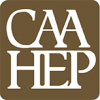





Attend Classes at a California (CA) Campus Near You!
The Surgical Technologist program is available at the following campuses:
Meet a Graduate
Questions?
Let us help you launch your career by contacting us today. Simply fill out the form below or call us at 1-888-408-4211. Classes are starting soon!
Surgical Technology Careers & Work Environment
The Surgical Technologist program at North-West College provides the education and training needed to begin a career working in a variety of different medical and health care facilities.
Graduates of the program routinely find jobs working in:
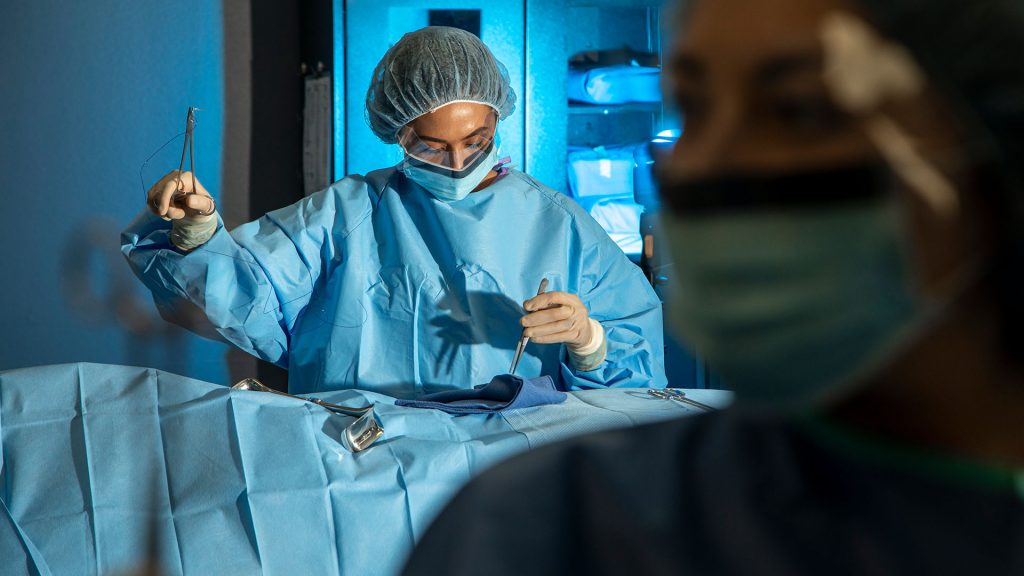


Quick Facts about Surgical Technologists*
Surgical Technology Course Material
The Surgical Technology program is designed to instruct in all phases of Surgical Technology, and to prepare competent, entry-level surgical technologists in the cognitive (knowledge), psychomotor (skills), and affective (behavior) learning domains. Upon completion, the graduate can effectively work with and under the supervision of surgeons or registered nurses and become an integral part of the team providing care to patients during the crucial periods of surgery. Much of the training is focused on the clinical aspect of the program where the students gain skills in helping to set up the operating room; prepare patients for surgery; scrub, gown and glove self and other team members; pass instruments and other sterile supplies to surgeons; help care for and dispose of specimens; and assist nurses in cleaning and stocking the operating room for the next operation. The curriculum reflects the latest developments in biomedical science. A graduate of the Surgical Technology program may be employed as a member of an operating room team, which includes surgeons, anesthesiologists, and circulating nurses. In addition to hospital operating rooms, our graduates will be qualified to work in surgical centers, delivery rooms, and medical clinics.
Seminar for Success
This introductory course provides an overview of learning readiness skills, including how to study, student learning styles, reading skills to increase comprehension, time management and stress management, communication, teamwork, and leadership, an overview of basic health care-related math skills, and an introduction to medical terminology, including word parts and basic medical terms related to body systems. This course also introduces students to the field of surgical technology and the expectations of the surgical technology program.
The Human Body I
This course focuses on the structure, function, and disease processes of the human body including the organization structure of the human body, the Integumentary, Musculoskeletal, Neuro-Sensory, and Endocrine and medical terminology related to these systems. The course also includes an overview of the concepts and principles of microbiology as related to surgical practice, including microbe-based diseases and immunology. Outside preparation and study time, in addition to regular classroom activities, is required to complete the class assignments. The type of outside preparation may take the form of homework assignments, projects, reading, and required studying.
Fundamentals
This course introduces the student to the broad field of Surgical Technology by addressing topics and concepts related to the health care setting. Included in this course is the job description of the Surgical Technologist, descriptions of the roles of care providers in the OR, including the role of the Surgical Technologist-Scrub Role (STSR), ethical, moral, and medico-legal practice, professional communication, teamwork, and employment skills. This course also presents concepts related to operating room practice and discusses the biopsychosocial needs of the surgical patient. The course also addresses the principles and techniques of disinfection, sterilization, and antisepsis as they apply to the Operating Room. The laboratory component of the course focuses on the skills related to the processing of surgical instrumentation and supplies in a non-patient utilization setting.
The Human Body II
This course focuses on the structure, function, and disease processes of the human body including the Circulatory, Cardiovascular, Lymphatic, Respiratory, Gastrointestinal, Genitourinary, and Male and Female Reproductive Systems, and medical terminology related to these systems. This course also includes an introduction to pharmacology including medication types, sources, classifications, dosages, uses, and medications commonly used in surgery. Concepts of anesthesia, including methods, types, administration, and potential complications are also discussed.
Asepsis
This course introduces the knowledge, skills, and techniques utilized to prepare the patient for the surgical experience and to prepare and maintain the sterile field during the surgical experience. Included are pre-operative patient preparation, gowning and gloving, the establishment of the sterile field with the equipment, instruments, and supplies; patient positioning and skin preparation. pre-, intra-, and postoperative case management techniques.
Mock Lab
This course provides a laboratory environment in which students concentrate on development of skills and practical performances by preparing for a surgical procedures in a non-patient contact environment. Emphasis will be placed on learning and understanding the different responsibilities of the scrub and assistant circulator roles in the operating room and how to build teamwork by providing the student with the opportunity to assume sterile and non-sterile member roles, as well as an understanding of safety concepts, including instrument, sponge, and needle counts, as well as patient identification. During this course, students are given the opportunity to discuss, understand and demonstrate group dynamics, cultural diversity, leadership, and teamwork.
Surgical Procedures I
This course focuses on integration of the professional knowledge of the Surgical Technologist using the procedural format. The anatomy, physiology, pathophysiology, case management, and patient considerations of General Surgery, Obstetrics and Gynecologic Surgery, Genitourinary Surgery, Otorhinolarygologic Surgery, and Oral/Maxillofacial Surgery will be presented.
Surgical Procedures Lab I
This course provides a laboratory environment in which students concentrate on further development of skills and practical performances by preparing for a variety of basic surgical procedures in a non-patient contact environment. Emphasis will be placed on learning and understanding the different roles in the operating room and how to build teamwork by providing mock situations in which students will have the opportunity to assume sterile and non-sterile member roles, as well as an understanding of safety concepts, including instrument, sponge, and needle counts, as well as patient identification. During this course, students are given the opportunity to discuss, understand and demonstrate group dynamics, cultural diversity, leadership, and teamwork.
Surgical Procedures II
This course focuses on integration of the professional knowledge of the Surgical Technologist using the procedural format. The anatomy, physiology, pathophysiology, case management, and patient considerations of Orthopedic Surgery, Ophthalmic Surgery, Plastic/Reconstructive Surgery, Cardiothoracic and Peripheral Vascular Surgery, and Neurosurgical Surgery will be presented.
Surgical Procedures Lab II
This course provides a laboratory environment in which students concentrate on further development of skills and practical performances by preparing for a variety of more complex surgical procedures in a non-patient contact environment. Emphasis will be placed on learning and understanding the different roles in the operating room and how to build teamwork by providing mock situations in which students will have the opportunity to assume sterile and non-sterile member roles, as well as an understanding of safety concepts, including instrument, sponge, and needle counts, as well as patient identification. During this course, students are given the opportunity to discuss, understand and demonstrate group dynamics, cultural diversity, leadership, and teamwork.
Sterile Processing
This course focuses on completion of a rotation in the Sterile Processing Department of a health care facility where the student will participate in the instrument reprocessing experience including sterilization, disinfection, tray assembly, sterile storage, and distribution.
Clinical Externship I
This course focuses on application of professional knowledge, skills, and behaviors in a patient care setting at a local health care facility. The student will actively participate in basic to moderately-complex surgical procedures in the assistant circulator, observation, second scrub, and first scrub roles.
Clinical Externship II
This course focuses on application of professional knowledge, skills, and behaviors in a patient care setting at a local health care facility. The student will actively participate in moderately-complex to complex surgical procedures in the assistant circulator, observation, second scrub, and first scrub roles.
CST Exam Review
This course focuses on a comprehensive review of the surgical technology curriculum in preparation to take the National Board for Surgical Technology and Surgical Assisting (NBSTSA) CST® Certification exam and the Program Final Exam (PFE).
Surgical Technology Course Activities
Surgical Technologists, also called operating room technicians, assist in surgical operations. They prepare operating rooms, arrange equipment, and help doctors during surgeries.
Before an operation, Surgical Technologists prepare the operating room by setting up surgical instruments and equipment. They also prepare patients for surgery by washing and disinfecting incision sites, positioning the patients on the operating table, covering them with sterile drapes, and taking them to and from the operating room. Surgical Technologists prepare sterile solutions and medications used in surgery and check that all surgical equipment is working properly. They help the surgical team put on sterile gowns and gloves.
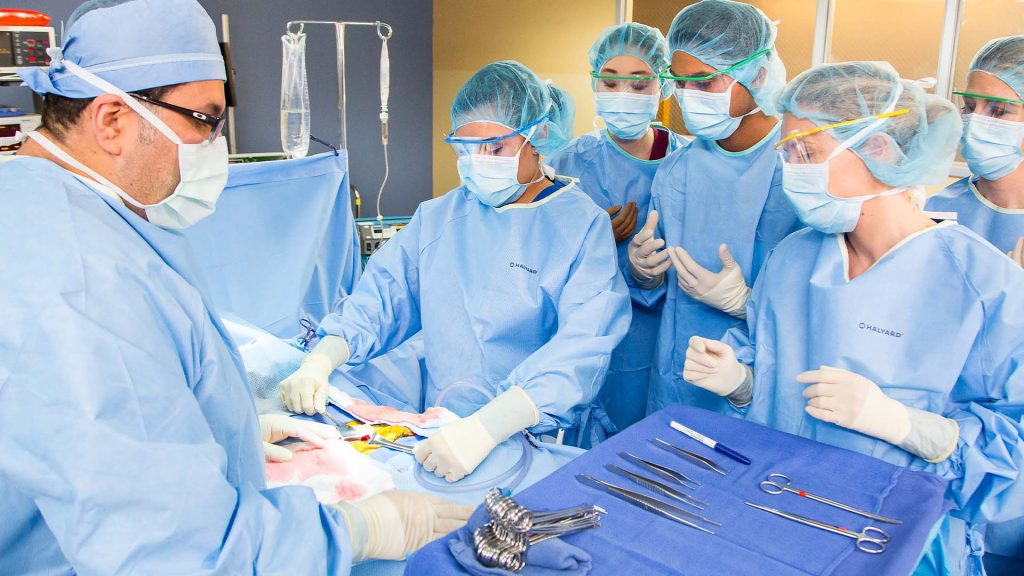


Surgical Technologists typically perform the following tasks:
Questions?
Let us help you launch your career by contacting us today. Simply fill out the form below or call us at
1-888-408-4211
Classes are starting soon!
Request Information
Fill out a short online form and one of our Admissions Representatives will reach out and answer all of your questions.
Apply Online Now!
Ready to make your decision? You can apply online now in less than a few minutes.
Schedule a Tour
Come and see us in person! Talk to your future instructors, meet your future classmates and get familiar with your new home.
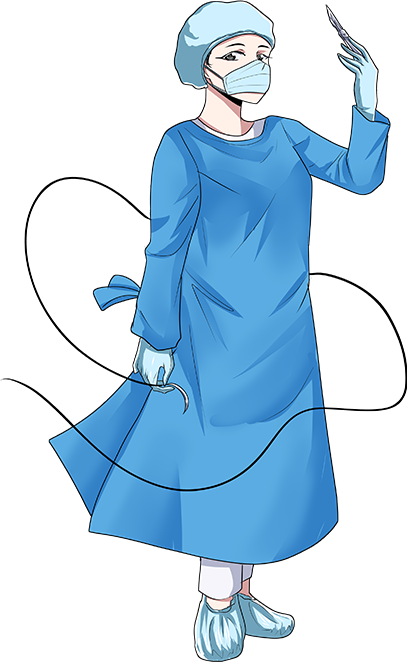

Surgical Technology Overview
Surgical Technologists, also called operating room technicians, prepare operating rooms, arrange equipment, and assist doctors during surgeries. Surgical Technologists are responsible for preparing the operating room by setting up surgical instruments and equipment, preparing patients for surgery, helping the surgical team put on sterile gowns and gloves, and preparing sterile solutions and medications used in surgery.
Once the operation is complete, Surgical Technologists may apply bandages and other dressings to the incision site. They may also help transfer patients to recovery rooms and restock operating rooms after a procedure.
Surgical Technologists routinely perform a variety of important tasks, including:
The Surgical Technologist program at North-West College is a career-focused program that teaches technical skills and provides the hands-on training experience required to begin working with surgeons, anesthesiologists, certified registered nurse anesthetists, registered nurses and other surgical personnel as a member of a surgical team.
The Surgical Technologist programs at the North-West College Anaheim, Long Beach, Riverside, and West Covina campuses are accredited by the Commission on Accreditation of Allied Health Education Programs (CAAHEP – www.caahep.org) upon the recommendation of the Accreditation Review Council on Education in Surgical Technology and Surgical Assisting (ARC/STSA).
* North-West College cannot guarantee employment.
CST Exam Passage Rates
Proudly accredited, licensed to operate and/or recognized by the following institutions: Accredited by ABHES at San Diego












Attend Classes at a California (CA) Campus Near You!
The Surgical Technologist program is available at the following campuses:
Meet a Graduate
Questions?
Let us help you launch your career by contacting us today. Simply fill out the form below or call us at 1-888-408-4211. Classes are starting soon!
Surgical Technology Careers & Work Environment
The Surgical Technologist program at North-West College provides the education and training needed to begin a career working in a variety of different medical and health care facilities.
Graduates of the program routinely find jobs working in:



Quick Facts about Surgical Technologists*
Surgical Technology Course Material
The Surgical Technology program is designed to instruct in all phases of Surgical Technology, and to prepare competent, entry-level surgical technologists in the cognitive (knowledge), psychomotor (skills), and affective (behavior) learning domains. Upon completion, the graduate can effectively work with and under the supervision of surgeons or registered nurses and become an integral part of the team providing care to patients during the crucial periods of surgery. Much of the training is focused on the clinical aspect of the program where the students gain skills in helping to set up the operating room; prepare patients for surgery; scrub, gown and glove self and other team members; pass instruments and other sterile supplies to surgeons; help care for and dispose of specimens; and assist nurses in cleaning and stocking the operating room for the next operation. The curriculum reflects the latest developments in biomedical science. A graduate of the Surgical Technology program may be employed as a member of an operating room team, which includes surgeons, anesthesiologists, and circulating nurses. In addition to hospital operating rooms, our graduates will be qualified to work in surgical centers, delivery rooms, and medical clinics.
Seminar for Success
This introductory course provides an overview of learning readiness skills, including how to study, student learning styles, reading skills to increase comprehension, time management and stress management, communication, teamwork, and leadership, an overview of basic health care-related math skills, and an introduction to medical terminology, including word parts and basic medical terms related to body systems. This course also introduces students to the field of surgical technology and the expectations of the surgical technology program.
The Human Body I
This course focuses on the structure, function, and disease processes of the human body including the organization structure of the human body, the Integumentary, Musculoskeletal, Neuro-Sensory, and Endocrine and medical terminology related to these systems. The course also includes an overview of the concepts and principles of microbiology as related to surgical practice, including microbe-based diseases and immunology. Outside preparation and study time, in addition to regular classroom activities, is required to complete the class assignments. The type of outside preparation may take the form of homework assignments, projects, reading, and required studying.
Fundamentals
This course introduces the student to the broad field of Surgical Technology by addressing topics and concepts related to the health care setting. Included in this course is the job description of the Surgical Technologist, descriptions of the roles of care providers in the OR, including the role of the Surgical Technologist-Scrub Role (STSR), ethical, moral, and medico-legal practice, professional communication, teamwork, and employment skills. This course also presents concepts related to operating room practice and discusses the biopsychosocial needs of the surgical patient. The course also addresses the principles and techniques of disinfection, sterilization, and antisepsis as they apply to the Operating Room. The laboratory component of the course focuses on the skills related to the processing of surgical instrumentation and supplies in a non-patient utilization setting.
The Human Body II
This course focuses on the structure, function, and disease processes of the human body including the Circulatory, Cardiovascular, Lymphatic, Respiratory, Gastrointestinal, Genitourinary, and Male and Female Reproductive Systems, and medical terminology related to these systems. This course also includes an introduction to pharmacology including medication types, sources, classifications, dosages, uses, and medications commonly used in surgery. Concepts of anesthesia, including methods, types, administration, and potential complications are also discussed.
Asepsis
This course introduces the knowledge, skills, and techniques utilized to prepare the patient for the surgical experience and to prepare and maintain the sterile field during the surgical experience. Included are pre-operative patient preparation, gowning and gloving, the establishment of the sterile field with the equipment, instruments, and supplies; patient positioning and skin preparation. pre-, intra-, and postoperative case management techniques.
Mock Lab
This course provides a laboratory environment in which students concentrate on development of skills and practical performances by preparing for a surgical procedures in a non-patient contact environment. Emphasis will be placed on learning and understanding the different responsibilities of the scrub and assistant circulator roles in the operating room and how to build teamwork by providing the student with the opportunity to assume sterile and non-sterile member roles, as well as an understanding of safety concepts, including instrument, sponge, and needle counts, as well as patient identification. During this course, students are given the opportunity to discuss, understand and demonstrate group dynamics, cultural diversity, leadership, and teamwork.
Surgical Procedures I
This course focuses on integration of the professional knowledge of the Surgical Technologist using the procedural format. The anatomy, physiology, pathophysiology, case management, and patient considerations of General Surgery, Obstetrics and Gynecologic Surgery, Genitourinary Surgery, Otorhinolarygologic Surgery, and Oral/Maxillofacial Surgery will be presented.
Surgical Procedures Lab I
This course provides a laboratory environment in which students concentrate on further development of skills and practical performances by preparing for a variety of basic surgical procedures in a non-patient contact environment. Emphasis will be placed on learning and understanding the different roles in the operating room and how to build teamwork by providing mock situations in which students will have the opportunity to assume sterile and non-sterile member roles, as well as an understanding of safety concepts, including instrument, sponge, and needle counts, as well as patient identification. During this course, students are given the opportunity to discuss, understand and demonstrate group dynamics, cultural diversity, leadership, and teamwork.
Surgical Procedures II
This course focuses on integration of the professional knowledge of the Surgical Technologist using the procedural format. The anatomy, physiology, pathophysiology, case management, and patient considerations of Orthopedic Surgery, Ophthalmic Surgery, Plastic/Reconstructive Surgery, Cardiothoracic and Peripheral Vascular Surgery, and Neurosurgical Surgery will be presented.
Surgical Procedures Lab II
This course provides a laboratory environment in which students concentrate on further development of skills and practical performances by preparing for a variety of more complex surgical procedures in a non-patient contact environment. Emphasis will be placed on learning and understanding the different roles in the operating room and how to build teamwork by providing mock situations in which students will have the opportunity to assume sterile and non-sterile member roles, as well as an understanding of safety concepts, including instrument, sponge, and needle counts, as well as patient identification. During this course, students are given the opportunity to discuss, understand and demonstrate group dynamics, cultural diversity, leadership, and teamwork.
Sterile Processing
This course focuses on completion of a rotation in the Sterile Processing Department of a health care facility where the student will participate in the instrument reprocessing experience including sterilization, disinfection, tray assembly, sterile storage, and distribution.
Clinical Externship I
This course focuses on application of professional knowledge, skills, and behaviors in a patient care setting at a local health care facility. The student will actively participate in basic to moderately-complex surgical procedures in the assistant circulator, observation, second scrub, and first scrub roles.
Clinical Externship II
This course focuses on application of professional knowledge, skills, and behaviors in a patient care setting at a local health care facility. The student will actively participate in moderately-complex to complex surgical procedures in the assistant circulator, observation, second scrub, and first scrub roles.
CST Exam Review
This course focuses on a comprehensive review of the surgical technology curriculum in preparation to take the National Board for Surgical Technology and Surgical Assisting (NBSTSA) CST® Certification exam and the Program Final Exam (PFE).
Surgical Technology Course Activities
Surgical Technologists, also called operating room technicians, assist in surgical operations. They prepare operating rooms, arrange equipment, and help doctors during surgeries.
Before an operation, Surgical Technologists prepare the operating room by setting up surgical instruments and equipment. They also prepare patients for surgery by washing and disinfecting incision sites, positioning the patients on the operating table, covering them with sterile drapes, and taking them to and from the operating room. Surgical Technologists prepare sterile solutions and medications used in surgery and check that all surgical equipment is working properly. They help the surgical team put on sterile gowns and gloves.



Surgical Technologists typically perform the following tasks:
Questions?
Let us help you launch your career by contacting us today. Simply fill out the form below or call us at
1-888-408-4211
Classes are starting soon!

